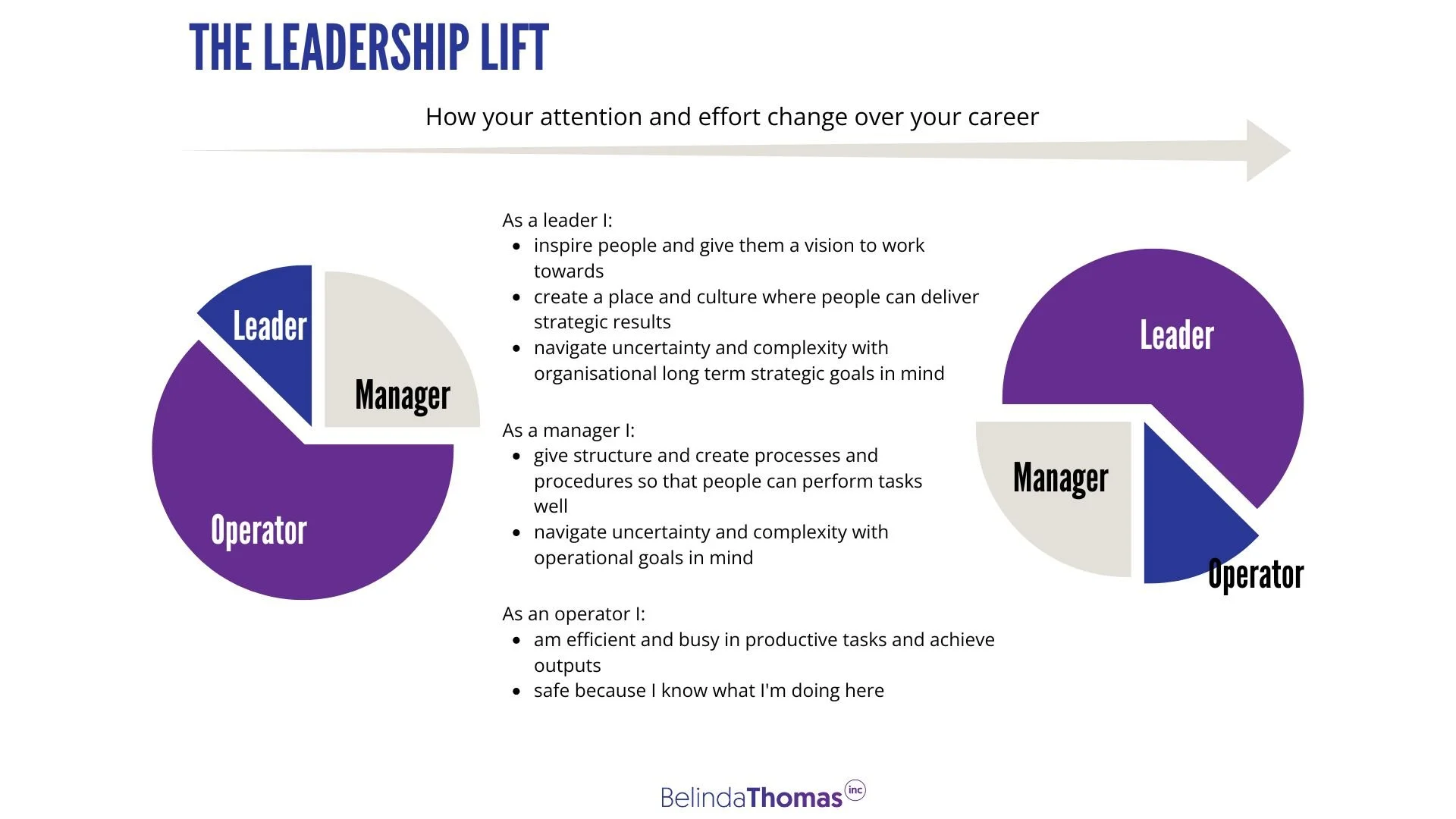MANAGER AND LEADER - WHAT’S THE DIFFERENCE?
The most normal thing in the world is leaders who are stuck in management mode, or don’t know what it means to lead
That’s not fabulous, but it could be you because it’s so normal. So, let’s kick any mediocrity lurking in your leadership right outta here.
In my work, I’ve met hundreds, possibly thousands, of leaders who are stuck in management mode. Who’s counting? Not me. The important thing is helping leaders get The Leadership Lift so that they can achieve incredible things.
It’s natural to get stuck, or frustrated and confused
It might be that your teams aren’t doing as well as they should. Or when you’re getting nowhere trying to influence your leadership so that they can make better business decisions or give you more budget.
How are you even supposed to recognise the difference between management and leadership?
Most leaders aren’t taught how to lead, and many have NEVER experienced great leadership.
Brilliant operational management is one thing. It’s important and, it’s necessary at a level. But it’s a ceiling. To achieve great things and be the sparkling unicorn you and your organisation need you to be, it’s next-level leadership that’s called for. The world isn’t only calling out for great leadership – it’s bl**dy near screaming for you to be the leader you can be.
And you can kick mediocrity and that painful frustration straight to the curb at the same time.
Let’s simplify the difference between operations, management and a leadership focus.
You’ve probably already heard something along the lines of:
‘Leaders inspire their teams to successfully smash their goals,
while managers craft the structure they need to do that.’
I think there’s a bit more to it. This graphic goes further to explain the differences. Take a screenshot of it, it’s one I use a lot and has changed how hundreds of leaders think about how they spend their time.
Most people start in their careers as operators focusing on becoming masterful at delivering outputs.
Management is the next logical step. You start to understand more about the processes that are relevant to success your organisation, and what’s needed to streamline them. It’s also when you can start inspiring people and giving them that much desired clarity about what good management is. Being brilliant as you are, you’ll make people’s lives a bit easier and grow a following of people who think you are the ducks nuts!
Next is when you’re asked to lead, and assuming you have the right intel, your focus shifts into leadership.
At the leadership level you:
share vision so that other people can see where the company is going
inspire and enable other people to contribute to our success so that they can contribute great things.
support people through challenging times
check-in with people when I need to, but get out of people’s way so that they can do their best work
create a culture where people and the business will thrive
think as much about other’s career development as your own
That whisper of doubt you hear rustling like a rat in the ceiling – it’s also normal. It’s smart of you. Being in leadership mode full-time isn’t a reality, nor does it need to be. Leadership and management go hand in hand in most roles, so you’ll be doing a bit of both.
Yup, you might even get on the tools from time to time. That’s okay too. What sets you apart and lets you shine, is knowing when you are doing those roles, and how much time you should be spending in them.
Here’s why even experienced leaders may feel the pull towards operations
it might feel safe because you know what you are doing
it may be because of the pressure you feel to deliver outputs
you could be in an exciting new venture and you’re tempted to be doing rather than leading
How the different focus levels play out in problem-solving
Ops: look at problems
Managers: solve complex problems and find solutions
Leaders: streamline solutions by removing barriers and blowing up bureaucracy. Then get right out of the way so that people can be brilliant
Accountability is an area you’ll notice different thinking too
Ops: achieve outputs, and tick things off
Managers: request process reviews, look at data, summarise options and information so that people can get their jobs done well
Leaders: constantly ask what the organisation needs, and how to create a culture and vision that motivates people towards it
You got this!
Sprinkle a bit more leadership in your life. Of course you’ll achieve more, go further and create more sustainable results. But there’s so much more….
Expect to be delighted by your powerful curiosity, astounded at your potential, and excited by the wider impact having the leadership lift gives you.
Want to know more? Asking questions like a leader, not a manager is another good read. Here’s where to find it.


